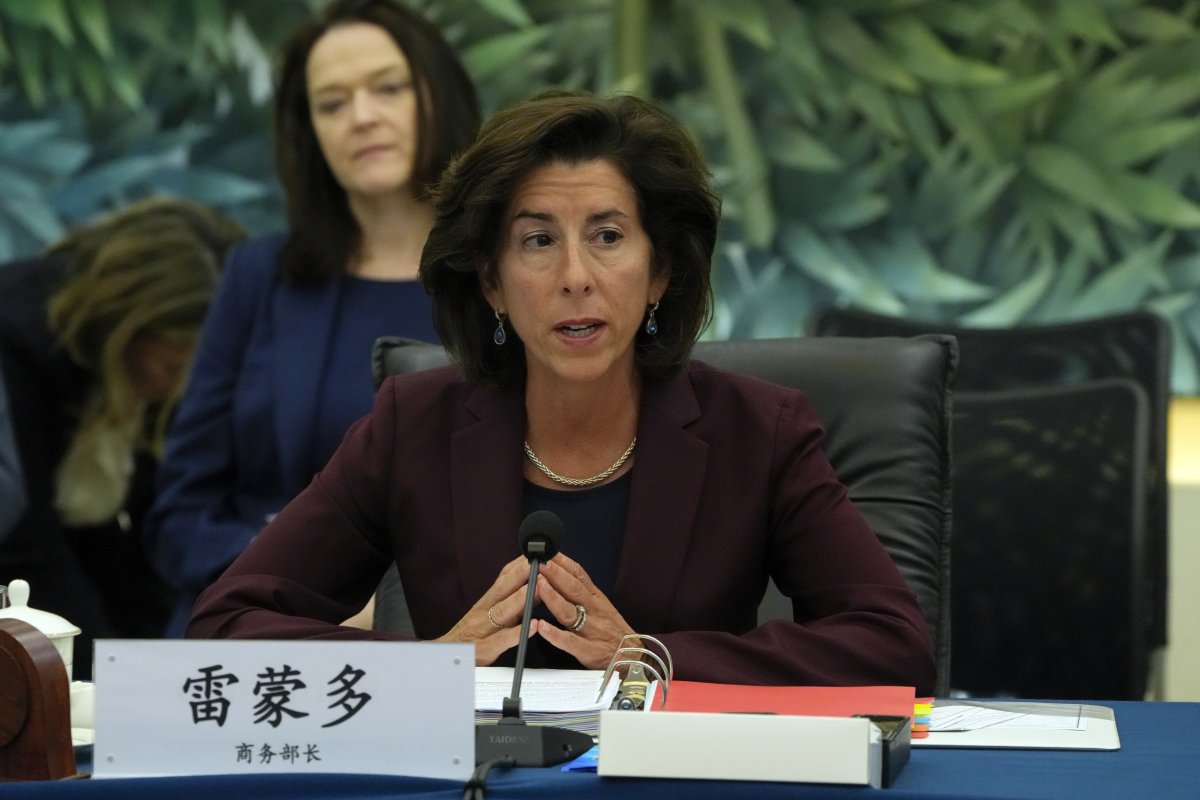The United States and China have agreed to set up working groups on commerce and trade issues, U.S. Commerce Secretary Gina Raimondo said on the first day of a four-day trip to Beijing.
Her trip comes as concerns over China's economy have sent shudders through global markets and brought further concerns about the potential impact on the U.S., even as it sees the world's second largest economy as its biggest strategic rival and as relations have been strained by years of tussling over trade and security concerns.
Raimondo is the fourth senior U.S. government official to visit China in recent months; Beijing is yet to reciprocate with its own senior representatives, but both countries are seeking ways to improve economic relations.
Two new channels of communication will be created, to open dialogue on national security and commerce, Raimondo said.

Raimondo met her Chinese counterpart, Commerce Minister Wang Wentao, and agreed on the two forums. "We share $700 billion dollars of trade, and I concur with you that it is profoundly important that we have a stable economic relationship," she told Wang.
"It's a complicated relationship; it's a challenging relationship. We will of course disagree on certain issues, but I believe we can make progress if we are direct, open, and practical," she said.
Wang said it was a "great pleasure to conduct dialogue and coordination in the field of economy and trade".
They agreed to create an "export control enforcement information exchange" to "reduce misunderstanding of U.S. national security policies," alongside a working group on commerce, he said.
U.S. trade curbs and President Joe Biden's plan to widen them have soured relations between the two countries.
The most recent data from China's National Bureau of Statistics showed youth unemployment had reached a record high of 21.3 percent in June. Then in early August, the government said it would suspend publication of the joblessness figures—long used an indicator to gauge the health of its economy—pending a review of its methodology.
Chinese companies will this week begin releasing their earnings reports, throwing some light on the extent of the slowdown.
Problems in China's property market have contributed to the economic woes. Shares in property developer Evergrande fell as much as 87 percent, after disclosing first-half losses of $4.5 billion.
Country Garden, once China's largest private real estate developer, also warned this week that it could lose up to $7.6 billion for the first six months of 2023, having already missed two U.S. dollar bond payments totalling $22.5 million this month.
Raimondo told officials there was "no room to compromise or negotiate" on U.S. national security," adding that "the vast majority of our trade and investment relationship does not involve national security concerns."
"We believe a strong Chinese economy is a good thing. We seek healthy competition with China. A growing Chinese economy that plays by the rules is in both of our interests," she said.
Biden's critics have accused his administration of being too eager to engage with China unilaterally while receiving little in return. China's Foreign Ministry said last week that it had "nothing to share" about upcoming visits to the U.S. by senior Chinese officials.
But the discourse between Beijing and Washington became less tenuous after the visits to China by each of U.S. Secretary of State Antony Blinken, Treasury Secretary Janet Yellen and climate envoy John Kerry, said Shirley Martey Hargis, a senior fellow with the Third Way think tank's national security program.
Hargis said it was "a wise way to reintroduce creating the space necessary for talks."
"Without the strategic face-to-face reintroduction, Raimondo's visit would have been unlikely or kicked down the road. The U.S. and China have struggled to strike a balance between maintaining communications while competing. Raimondo's visit may be the first to begin to showcase what that balance may look like most effectively as she represents current U.S.-China issues that are the most front and center," Hargis told Newsweek.
She said: "This meeting is only about setting up processes rather than solving all the challenges. One of the reasons Biden sees this as necessary is because he knows well that our allies, in an increasingly globalized world, will be heavily impacted by our de-risking. None of this happens in a vacuum. Trade must continue, and it must be strong. China and its economy are going nowhere, whether it gets increasingly worse or not."
Update 8/23/23, 12:15 p.m. ET: This article was updated with additional context.
Uncommon Knowledge
Newsweek is committed to challenging conventional wisdom and finding connections in the search for common ground.
Newsweek is committed to challenging conventional wisdom and finding connections in the search for common ground.
About the writer
To read how Newsweek uses AI as a newsroom tool, Click here.








